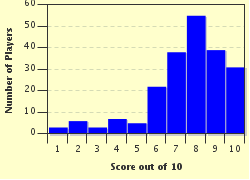Quiz Answer Key and Fun Facts
1. A Whatchamacallit is a candy bar made by Hershey but that's not what we are after here. The word whatchamacallit and similar words are known as ____ because they fill the position of words that one cannot recall, are unknown, or, as is the case in mathematics and logic, merely represent another word. As a Buckaroo, lasso the word that fills in the blank.
2. Our next dogie to be rounded-up is a word that wordreference.com says is the same as thingummy and means "a person or thing whose name one has forgotten, does not know, or does not wish to mention." Edgar Allan Poe wrote a short story entitled "The Literary Life of ________, Esq." as a play on this word. Which dogie is this?
3. The next word is a stray that needs to be corralled because it has wandered way far away from the herd. It derives from an actual place in Africa that has come to describe anywhere that is far off. Which word is this?
4. Our next heifer thinks she's an unidentified human or maybe she is confused because her name also sounds like fish eggs. Okay cowpuncher, which name fits these descriptions and was also the plaintiff in a famous 1973 Supreme Court decision?
5. Our next word started out as a military acronym used to describe a situation that has gone terribly wrong. Which maverick is this that got caught up in some thorny bushes and needs to be rescued?
6. Our next group of cattle has gotten into the Locoweed and is acting all crazy. Their mooing has turned downright unintelligible. Which phrase would best describe their mooing, or language that is unnecessarily complex such as is used in religious rites or legal proceedings?
7. The next critter you encounter out on the range is a word used to describe both a small program used in conjunction with a graphical user interface and any unnamed mechanical or manufactured device. It is your job as the ranahan to identify this word.
8. As a waddie you spend many hours in the saddle which reminds you of what it's like to deal with bureaucrats. What color is the tape that people use to describe the nightmare dealing with a bureaucracy?
9. As the working day comes to an end on the ranch, you, as Cow Boss, wonder if you will be able to get all of the work done in time. What phrase that comes from the Bible (Matt. 20:6-16) is used to describe getting a project done at the last minute?
10. Your work as a drover is almost over; you have only one more slick to rope. What word can describe an insect, a microorganism like a virus, a defect in a mechanical device or computer program, or an obsession?
Source: Author
tazman6619
This quiz was reviewed by FunTrivia editor
looney_tunes before going online.
Any errors found in FunTrivia content are routinely corrected through our feedback system.

